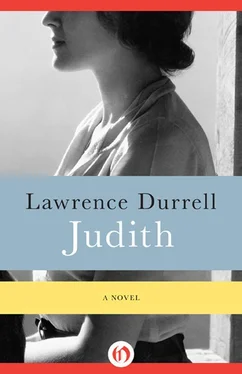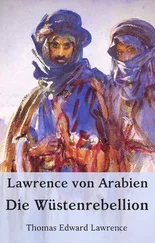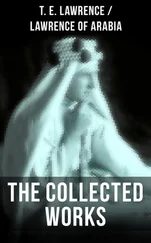In these small pools of light they saw scenes enacted, as if from the panels of some Byzantine fresco: miniatures of a horse being cut from its traces and shot, a naked man receiving an injection, a moaning camel being pegged down on the grass. And everywhere the wounded were being selected from among the dead. Stretcher-bearers made what haste they could with their burdens across the meadows. The sky was full of stars, glimmering like precious stones. It was cold. Grete found herself shivering as much from chill as from fear. Dawn was already coming up, to judge by the swift lightening of the mountain ranges to the east.
At last they came to a fold in the banks of the river — a green strip covered with wild orchids and meadow flowers. Here Tonio quested about for a moment like a greyhound. Then he gave a grunt and pointed.
David’s sturdy form lay coiled up and very still at the bottom of a hollow of deep grass; one arm was doubled under him in an attitude which suggested some severe dislocation of shoulder and spine. The other, fully extended, was buried in the earth. The flickering light wavered and jumped upon the tremendous stillness of him as he lay there.
Tonio halted, uncertain what to do. He still held the child’s hand. But now Grete was kneeling beside her lover, turning the dark head and cradling it in her arms as she bent over him. Suddenly she looked up and, almost beside herself with astonishment, called out, but in tones so unbelieving that they carried no conviction:
“He’s breathing. He’s alive.”
They stood like figures turned to salt, Grete staring blindly up into the light of the torch, repeating “He’s alive. He’s alive.”
Then, as if the sum total of the knowledge had suddenly gone home like a bayonet thrust, the huge shaggy Balt turned and shouted across the darkness to where the stretcher-bearers moved among the dead, seeking the living. A party moved towards them and Grete saw the lights advance and brim the hollow with whiteness. Strange voices crowded about them.
An orderly knelt for a minute and listened to the feeble heartbeat in the chest wall of the fallen man — as one might listen in a cave for the voice of an oracle.
“Yes,” he said at last. “Yes.”
Grete thought she had never heard a sweeter word. “Yes,” she repeated with a sob. “Yes. Yes.”
The small boy was looking at her. They had moved David onto a rough stretcher made of blankets. The party set off in the gathering light of the dawn along the river. And now it seemed as if some new power stirred within her as she walked beside them. David’s muddy hand hung over the side of the stretcher, jogging with the movement. His son seized hold of it, softly, proudly. And as they walked they heard — with the delectation of people hearing the opening bars of some great piece of music — the groans of David. Grete put her arm about the small boy’s shoulders.
“I was wrong,” she said to herself, “and he was right.”
Now that the pressure of the attack had been relieved, it was once more possible to organize, to improvise. And aid materialized from various quarters. Unsolicited lorries rolled in to help with the wounded who had overflowed the medical bays. The most serious cases were sent off by three-tonner or ambulance (whenever possible) to hospitals offering greater facilities than were available in the little dispensary of the settlement. Judith watched the hefty arms of the young Poles lift the victims softly into the lorries, and turned back in bitter resolution to the settlement. By now someone had restored the electric light unit, and the work was easier; but there was much to do. She was glad of it, and worked all night until she was practically asleep on her feet. She had not seen Aaron all evening, but knew he was alive and unhurt. Nothing could have given her more strength and determination. Relief she could not call it.
But the attack on Ras Shamir was only the most personal part of something which loomed much larger on the horizon, and which engaged their anxieties for months to come; it was strange that, all of a sudden, the concerns and pressures of war should make her feel the reality of Israel as an idea. But it was so. In April the stranglehold on Jerusalem was broken. Haifa was liberated, then Jaffa. All through that spring and summer the war flared up and subsided, changing aspect and design, changing sector. Stubbornly, bitterly, Israel was contending for her very existence, forging her national spirit in the brutal fire of war.
All this news, the source of so much pride and relief to the kibbutz, was sheer exhilaration for Aaron. He was truly part of it, a fighting part. He wanted to be on all fronts at once, and almost succeeded. He scanned the papers and listened to the radio; and some of his impatient excitement seeped into the letters he wrote to Judith from every part of the country. They were a curious mixture of ardour and reserve — almost as if he was unsure as yet how far he could commit himself or how much depend on the durability of her own feelings and emotions. Then one day she got the opportunity of a lift to visit him in Jerusalem. It was a surprise; to their astonishment and chagrin they found themselves almost tongue-tied, like adolescents. Judith’s heart beat so fast that she felt almost suffocated. “By God,” he said, “you are a good-looking girl!” She took his hand and held it to her breast. “Aaron,” she said, “how lucky I am. Darling I’ve been… She was almost overcome by the nearness of it. She held up crossed fingers. Aaron had grown large martial whiskers. “And you look like an Albanian bandit,” she said. “I hardly recognized you.”
Aaron grinned. “I’ve missed you terribly,” he said, trying to make the remark sound light-hearted and conversational, in order to hide his emotions.
“Do you think you could kiss through the foliage?” he asked. “I suppose one could get used to it?”
She had brought a small parcel of sweets and cigarettes, and there was also a little bunch of somewhat faded flowers. “They are from your country house,” she said. “I picked them yesterday.” For a moment tears came into his dark eyes, but he quickly embraced her to hide them. “I’m coming back to the valley at the end of the month,” he said. “Will you still be there, Judith?”
She was surprised almost to the point of anger. “Why not?” she exclaimed. He shook his head, still smiling and said, “I don’t know. I had a dream in which you went off in great pomp to America. More than one actually. It seemed quite logical.”
“And since when have you started having prophetic dreams?” she cried. “Oh, Aaron — please!” But he only held her closer, still smiling, and somewhere inside him unconvinced. “Of course I’ll be there when you get back,” she said, and then suddenly felt a shadow cross her mind, a shadow of doubt. Aaron said: “We must see what the new Israel… ha, how does that sound to you?… the new Israel has in store for us both. You the unbeliever, and me the sabra.”
“Ras Shamir will always be there,” she said. “Why shouldn’t I?”
“You must,” he said. “You really must.”
And yet the obstinate doubt persisted in their minds. Could the new Israel somehow separate them? She kissed him tenderly as she said goodbye, and promised to take any opportunity to visit him in the interval before his return. At the door she turned and stared at him for a long moment. He stared gravely back at her from under his dark brows, tenderly, yet unsmilingly. Then she turned and he heard her light step echoing on the staircase.
But the day before Aaron’s return she received a call from Professor Liebling in Jerusalem — so perhaps there was something to be said for prophetic dreams after all? She must hurry south to see him on matters of great urgency, said the message. So, with obedient reluctance, she entered the car which he had sent for her and set off through the green hazes of Galilee towards the capital city. She supposed that it had something to do with her father’s invention and she was not wrong. The Professor was waiting for her with an impatient enthusiasm which made him more than ever expansive. He embraced her warmly and fluttered around his desk like a sparrow from twig to twig. “America,” he said, “Judith — America!”
Читать дальше












